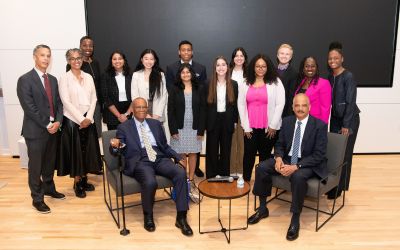Eric Holder Delivers Inaugural Thurgood Marshall Lecture
Former U.S. Attorney General Eric Holder urged law students to actively participate in shaping a more just society during the inaugural Justice Thurgood Marshall Lecture at Marshall's childhood elementary school in West Baltimore.

Seated L-R: Professor Larry Gibson and former Attorney General Eric Holder. Back Row L-R: Professor Michael Pinard; Dean Renée Hutchins Laurent; Monique Dixon, director Gibson-Banks Center; second from right, Professor Sherrilyn Ifill, Howard Law School, with Maryland Carey Law students.
The annual lecture series, which kicked off Sept. 25 at the newly renovated Thurgood Marshall Amenity Center in the Upton neighborhood, aims to honor Marshall's legacy and to inspire future generations of legal professionals.
"We can no longer afford to be patient," Holder told the audience, which included students from the University of Maryland Francis King Carey School of Law, Howard University School of Law, and the University of Baltimore (UB) School of Law.
"We must let ourselves feel injustices — and then fight for that which is right," said Holder, who served as the 82nd attorney general of the United States and was the first African American to hold the office.
The event's location holds special significance, according to Larry Gibson, LLB, Morton & Sophia Macht Professor of Law at Maryland Carey Law. "This is Thurgood Marshall's elementary school," Gibson said. "We are one block from where his grandparents had their store at Division and Dolphin. We are three blocks down the street on Division from where Thurgood Marshall lived during his youth," recounted Gibson, who authored two books about the nation’s first Black Supreme Court Justice.
The lecture series is supported by an endowment held at the University of Maryland Baltimore Foundation, connecting the University to Marshall's legacy. Fourteen law firms and individual sponsors have contributed to the endowment to date.
“Today's talk is the first of many to come,” the Hon. Andre M. Davis, JD '78, retired U.S Circuit Court judge and member of the organizing committee, told the room packed with attorneys, community activists, and politicians. The annual lecture will “provide insight into the history and future of our fragile democratic laws and traditions, traditions that Justice Marshall sought to protect for all Americans,” Davis, an emeritus member of the Maryland Carey Law board, said in introductory remarks.
Rev. Dr. Alvin Hathaway Sr., president and CEO of Beloved Community Services Corporation, led the efforts to acquire and renovate the former P.S. 103 building where Marshall attended elementary school. "This $15 million investment in the community allows us to partner with institutions and collaborate with them," Hathaway said. As a member of the organizing committee, he and chair Mary Miller were instrumental in getting the lecture series off the ground.
Calling the new center a "labor of love" and a "powerful resource for the community," Sherrilyn Ifill, JD, Vernon E. Jordan, Jr., Esq. Endowed Chair in Civil Rights at Howard University and former Maryland Carey Law faculty member, thanked Hathaway for his vision. Ifill, a Baltimore native who introduced Attorney General Holder, continued, “One of the things I love about Baltimore is the committed group of people who hold on to our history and make sure that we understand our goal in the evolution of democracy. This speaker series is a part of that.”
Michael Pinard, JD, professor and faculty director of the Gibson-Banks Center for Race & the Law at Maryland Carey Law, emphasized the event's importance for the future lawyers in attendance. "We want students to be inspired, to see themselves in Eric Holder and understand that the work before them is urgent, and they are more than equipped to do it."
Renée Hutchins Laurent, JD, dean of Maryland Carey Law, agreed, adding, "Attorney General Holder is a remarkable mentor and example of ways to use your law degree to advance justice."
Before his address, Holder engaged in a question-and-answer session with students from Maryland Carey Law, Howard Law, and UB Law moderated by Pinard. The former attorney general reminded students that although progress has been made, “There's a lot of work still to do.”
“Don't think your youth makes you ineffective. Every great social movement in this country has been fueled by the passion of the participation of young people,” he said. “Dr. King, John Lewis, they were youngsters and they tore down the system of American apartheid, so don't think you’re too young to make a difference.”
First-year Maryland Carey Law student Jaqueline Henry, who aspires to work in the Civil Rights Division at the U.S. Justice Department, took Holder’s advice to heart. “I believe that the law can be a vehicle for social change and that we can use to it to help people,” she said. “Right now, lawyers are safeguarding the Constitution, and I want to be a part of that.”
The annual lecture series will continue to feature distinguished lawyers, judges, and scholars discussing legal and social justice issues relevant to Justice Marshall's career.
For more information about how to donate to the Justice Thurgood Marshall Lecture Endowment, please contact Shara Boonshaft, associate dean for external relations at Maryland Carey Law (sboonshaft@law.umaryland.edu).



